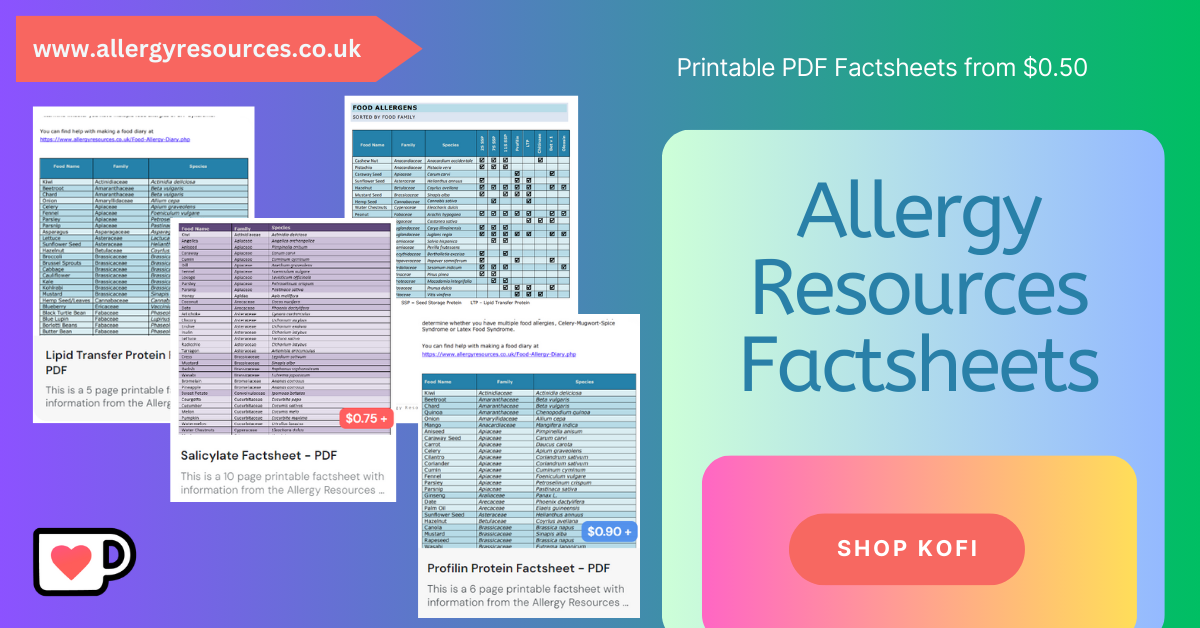
Polcalcin Proteins
This is a simplified description of polcalcin proteins – there are more resources available at the bottom of the page for further reading for those who are interested in knowing more.
They are found in tree, grass and weed pollens. They are very cross-reactive.
Polcalcin proteins have low sensitisation rates compared to other allergenic proteins and are therefore considered to be minor pollen panallergens. Other pollen panallergens are Bet v 1 allergens, profilin proteins and Lipid Transfer Proteins.
You can download a pollen allergens chart from my KOFI page for just $0.90 (£0.69 or €0.82)!
Other symptoms including urticaria (hives or welts), angioedema (swelling under the skin), nausea, abdominal pain, vomiting or breathlessness and anaphylactic shock are rare but not unheard of.
Recognising what groups of pollens may be aggravating your seasonal allergies or asthma may help in management of your symptoms. You can remove offending plants from your garden or have a better understanding of what times of the year you may suffer the most so you can be prepared with antihistamines.
What are polcalcin proteins?
Polcalcin are calcium binding proteins found in a relatively large group of plants. These proteins are involved in signaling processes (chemical signals between plants cells) and pollen tube growth.They are found in tree, grass and weed pollens. They are very cross-reactive.
Polcalcin proteins have low sensitisation rates compared to other allergenic proteins and are therefore considered to be minor pollen panallergens. Other pollen panallergens are Bet v 1 allergens, profilin proteins and Lipid Transfer Proteins.
Which pollens contain polcalcin proteins?
There are 12 pollen allergens associated with polcalcin proteins according to the World Health Organization (WHO) Allergen Index. These include alder, ragweed, mugwort, birch trees, white goosefoot, bermuda grass, juniper, olive, pellitory of the wall, timothy grass, sorghum, Russian thistle and lilac.You can download a pollen allergens chart from my KOFI page for just $0.90 (£0.69 or €0.82)!
Are there any foods which contain polcalcin proteins?
The World Health Organization recognises only 1 polcalcin allergen identified as causing allergic reactions after consumption of food. This is turnip.What symptoms do they cause?
Allergy to foods containing polcalcin proteins have a wide range of symptoms and severity but are most commonly associated with seasonal allergic rhinitis (hayfever) and allergic asthma.Other symptoms including urticaria (hives or welts), angioedema (swelling under the skin), nausea, abdominal pain, vomiting or breathlessness and anaphylactic shock are rare but not unheard of.
What is the importance of knowing whether a reaction is to polcalcin or other allergens?
Pollen allergies are difficult to manage, especially in comparison to foods, it is much easier to avoid certain foods than it is to avoid certain pollens.Recognising what groups of pollens may be aggravating your seasonal allergies or asthma may help in management of your symptoms. You can remove offending plants from your garden or have a better understanding of what times of the year you may suffer the most so you can be prepared with antihistamines.
Websites
Articles and Journals
A systematic review of allergen cross-reactivity: Translating basic concepts into clinical relevance, 2024
Sensitization patterns to Poaceae pollen indicates a hierarchy in allergens and a lead of tropical grasses, 2023
Complex IgE sensitization patterns in ragweed allergic patients: Implications for diagnosis and specific immunotherapy, 2022
Rational design of a hypoallergenic Phl p 7 variant for immunotherapy of polcalcin-sensitized patients, 2019
Identification of polcalcin as a novel allergen of Amaranthus retroflexus pollen, 2019
Clinical Relevance of IgE to Profilin and/or Polcalcin in Pollen-Sensitized Patients, 2016
How relevant is panallergen sensitization in the development of allergies? 2016
Characterization of Profilin and Polcalcin Panallergens From Ash Pollen, 2014
Component-resolved diagnosis of pollen allergy based on skin testing with profilin, polcalcin and lipid transfer protein pan-allergens, 2009
Profilin (Che a 2) and polcalcin (Che a 3) are relevant allergens of Chenopodium album pollen: Isolation, amino acid sequences, and immunologic properties, 2004
Sensitization patterns to Poaceae pollen indicates a hierarchy in allergens and a lead of tropical grasses, 2023
Complex IgE sensitization patterns in ragweed allergic patients: Implications for diagnosis and specific immunotherapy, 2022
Rational design of a hypoallergenic Phl p 7 variant for immunotherapy of polcalcin-sensitized patients, 2019
Identification of polcalcin as a novel allergen of Amaranthus retroflexus pollen, 2019
Clinical Relevance of IgE to Profilin and/or Polcalcin in Pollen-Sensitized Patients, 2016
How relevant is panallergen sensitization in the development of allergies? 2016
Characterization of Profilin and Polcalcin Panallergens From Ash Pollen, 2014
Component-resolved diagnosis of pollen allergy based on skin testing with profilin, polcalcin and lipid transfer protein pan-allergens, 2009
Profilin (Che a 2) and polcalcin (Che a 3) are relevant allergens of Chenopodium album pollen: Isolation, amino acid sequences, and immunologic properties, 2004
Let me know if you found any of these interesting or useful.
If you spot an article or research that you think is interesting you can message me or tag me on Facebook or Twitter - links at the bottom of the page